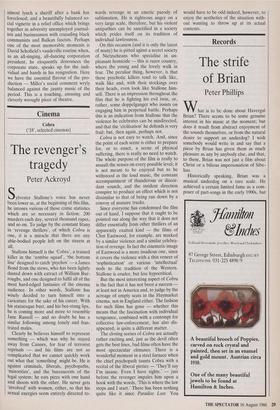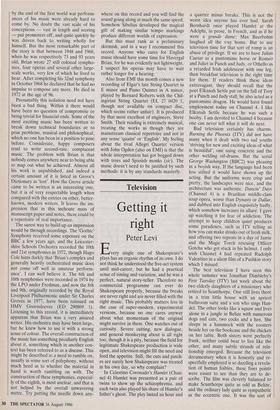Records
The strife of Brian
Peter Phillips
What is to be done about Havergal Brian? There seems to be some genuine interest in his music at the moment; but does it result from abstract enjoyment of the sounds themselves, or from the natural desire to support an underdog? I wish somebody would write in and say that a piece by Brian has given them as much pleasure as any by anybody else, and that, to them, Brian was not just a film about Christ or a bilious impersonation of Sibe- lius.
Historically speaking, Brian was a musical underdog on a rare scale. He achieved a certain limited fame as a com- poser of part-songs in the early 1900s, but by the end of the first world war perform- ances of his music were already hard to come by. No doubt the vast scale of his conceptions — vast in length and scoring — put promoters off, and quite quickly he was driven back to writing wholly for himself. But the most remarkable part of the story is that between 1948 and 1968, when he was respectively 73 and 93 years old, Brian wrote 27 still colossal sympho- nies, four operas and several other large- scale works, very few of which he lived to hear. After completing his 32nd symphony in October 1968 he declared that he had no impulse to compose any more. He died in 1972 at the age of 96.
Presumably this isolation need not have been a bad thing. Within it there would have been no question of compromise or being trivial for financial ends. Some of the most exciting music has been written to break down technical boundaries or to pose problems, musical and philosophical, which no one has been in a position to pose before. Considerate, happy composers tend to write second-rate, complacent music. The problem with Brian is that nobody comes anywhere near to being able to map out what he achieved. Almost all his work is unpublished, and indeed a certain amount of it is listed in Grove's Dictionary as 'lost'. How the Grove article came to be written is an interesting one, but it is of very respectable length when compared with the entries on other, better- known, modern writers. It leaves the im- pression that in this inchoate mass of manuscript paper and notes, there could be a repertoire of real importance.
The surest way to build up an impression would be through recordings. The 'Gothic' Symphony received some exposure on the BBC a few years ago, and the Leicester- shire Schools Orchestra recorded the 10th and 21st symphonies in 1972, though Hugo Cole hints darkly that 'Brian's complex and generally heavily orchestrated music does not come off well in amateur perform- ance'. I can well believe it. The 6th and 16th symphonies were recorded in 1974 by the LPO under Fredman, and now the 8th and 9th, originally recorded by the Royal Liverpool Philharmonic under Sir Charles Groves in 1977, have been reissued on HMV Greensleeves (ED 290869 1). Listening to this record, it is immediately apparent that Brian was a very assured writer. His orchestra may have been large, but he knew how to use it with a strong sense of colour. The overall construction of the music has something peculiarly English about it, something which in another con- text has been referred to as a disease. This might be described as a need to ramble on, usually in some sort of polyphony, without much heed as to whether the material in hand is worth rambling on with. The construction of these symphonies, especial- ly of the eighth, is most unclear, and that is not helped by the overall unwavering metre. Try putting the needle down any-
where on this record and you will find the sound going along at much the same speed. Somehow Sibelius developed the magical gift of making similar tempo markings produce different worlds of expression.
But this must rank as a preliminary skirmish, and in a way I recommend this record. Anyone who cares for English music should have some time for Havergal Brian, for he was evidently not lightweight. I suspect his operas may have to wait rather longer for a hearing.
Also from EMI this month comes a new recording of Elgar's late String Quartet in E minor and Piano Quintet in A minor, played by Bernard Roberts with the Chil- ingirian String Quartet (EL 27 0420 1, though not available on compact disc, which seems rather unfair). It is produced by that most excellent of engineers, Steve Smith. Their reading is extremely musical, treating the works as though they are mainstream classical repertoire and not in any sense 'quaint' or 'English'. My feeling about the rival Allegri Quartet version with John Ogden (also on EMI) is that the whole interpretation has got bogged down with trees and Spanish monks (sic). The music doesn't need to be justified by such methods: it is by any standards masterly.











































 Previous page
Previous page